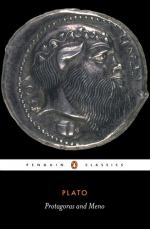|
This section contains 479 words (approx. 2 pages at 400 words per page) |

|
Section 3, Line 323-330 Summary and Analysis
Every man has access to virtue. This is the way the gods have made things. Even an evil man claims to be good if asked. If a man has no share of goodness and virtue, then he is considered not to be human. That is why all men claim to have an idea of what is virtuous and good, and they are allowed to vote and share their opinion with other citizens. Virtue must be teachable, since men listens to each others opinions in order to find out what is closest to virtue. Society punishes evildoers, in order to, in the future, make sure that they act virtuously. Thus evil doers are punished to teach them virtue and justice.
Protagoras in his argument goes through many examples of people, especially statesmen, who spare no effort with schools...
(read more from the Section 3, Line 323-330 Summary)
|
This section contains 479 words (approx. 2 pages at 400 words per page) |

|




